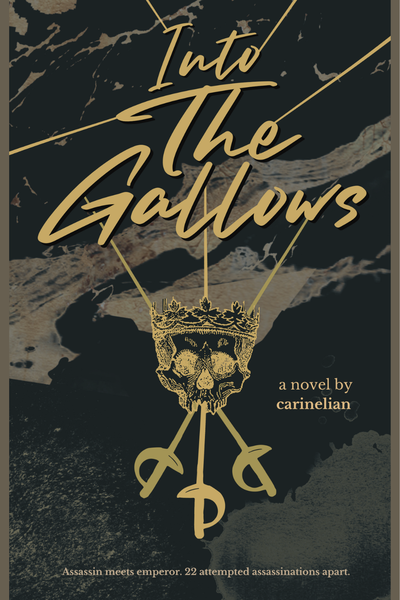“A child has no place in the battlefield, yet where else can I take her? I made her into an orphan, it was my responsibility to look after her. I hoped that being with the army would strengthen her, protect her, and save her.
I had forgotten. In the land of the doomed, the army is the least safest place of them all. Now, instead of toys, this child plays with lances and swords.
She says she owes me her life, but I think I killed her.”
-Unabridged journals of the Imperial Scribe; C???, p.???
For the Sibyllas, blood had always been thicker than water.
As one of the empire’s most highly regarded nobles, the family prided itself on its pure-as-snow bloodline, and when they weren’t out there marrying into the family, then they only selected the best of the best for their heirs. Florence’s mother, Elise, had once been betrothed to His Highness, granting her the favour of the entire clan.
You should’ve seen it, love. Only the finest silks and jewelries. Mother spared nothing for my dowry, and father almost broke tradition and made me the head of the household. Blood is thicker than water, they said. Only the best for the family.
Indeed, their blood was thicker than water, until it was ‘diluted’ by a peasant’s blood. Florence was lucky enough to be born at a much later time, completely oblivious of the life that his mother had been deprived from. His parents loved each other dearly, but love meant nothing to a family that only valued fortune and glory.
When Florence saw Helen’s mother kneeling in the snow, he was reminded of all the times that his own mother had tried to ask the Sibyllas for help. She would come home with bruised knees – a testament to how long she’d knelt in prostration – and empty hands, as proof of how little their own blood mattered.
Grandmother and grandfather aren't home, she would tell Florence, wearing that soft, sad smile that would haunt him for the rest of his life.
Maybe next time.
Whoever dared abandon their family in time of need don’t get to ask them for help in the future. If one cannot choose whom they were born from, then they can choose who they die as.
In some sick, twisted way, Florence waited for the sword to fall.
But instead of cutting her down, Aster had struck the snow.
Florence didn’t know whether he should feel disappointment or relief at that. His hands had lost their grip, and soon Helen was barrelling in defence of her mother, arms wide open as if she could shield the woman from someone like Aster.
“Please, Uncle! Don’t kill her!” She cried.
Florence watched her despondently. The child didn’t lie about needing their help – whatever she saw in them, it must have been kind enough for her to put her trust into strangers over the people that brought her into the world. They beat her up, made her a part of their scheme, put her in danger…and still she begs for their safety.
Aster turned to look at Florence, and it hit him, almost like a punch, that the man was waiting for him to say something.
Death isn’t something you play with, scribe. You don’t get to write names and have them crossed out of life so easily. It stays with you – that first kill. Even more so if it’s family.
Especially if it’s family.
“She’s still her mother,” Florence whispered.
Something flashed across Aster’s face, too brief for Florence to make out. Sensing that she’d gained an ally, the mother took it as a chance to speak out, making sure to look at Florence straight in the eye.
“I only did what I had to!” She pleaded. “This was the only way for our family to survive. You know what’s out there, the empire would sell us as slaves if they could.”
They already do, Florence thought bitterly. The Sibyllas made their fortune taking in unsuspecting migrants from Aphos and Taratus, promising them jobs only to work them to the bone once they reached the capital. Then, if it wasn’t the Sybillas, it was the remaining noble families – even the Ettores had their share of dirty work.
If being sent to Taratus counted as de-facto exile, then working at the Elyssia basically counted as a death sentence.
“You didn’t have to abuse your child, though. It’s cruel enough out here.”
“Exactly!” The mother surged forward. “Who else will teach her about the reality of the world, if not family?”
Florence had nothing to argue against that – after all, everything he knew about the ways of the world, he’d learned from the Sibyllas.
So instead of debating with her, Florence shifted his attention towards the little girl who continued to shield her mother. He put down the child’s hands slowly, until she was left with hands on her sides, trembling in the cold.
“You asked for our help,” he said, “so I’ll ask you now. Do you want to come back with them? Your father is still alive too.”
Helen only stared at him with watery eyes – a perfect replication of how they’d found her a night before – but this time, the situation had become real. One word from her and Florence would gladly become a murderer, and he had a feeling that Aster wouldn’t mind adding two more to his growing body count.
Blood is thicker than water, he thought, which is why some families eat their own. No one will blame you for biting back.
“Helen, dear,” the woman grabbed the little girl by the shoulders, “tell them that we’re good! Please! Or he’ll hurt your father and me—”
“Shut up,” he snapped. “I wasn’t talking to Helen, let her speak.”
The little girl stayed silent.
Florence let out a huge sigh. Figures. He turned towards Aster, then, with a tilt of his head, ordered the woman to be knocked out for the meantime.
He didn't know what terrified him more: the swiftness of Aster’s movements, or the fact that the man had immediately understood his signal.
“This is going nowhere,” Aster huffed, glancing irritably at Florence. “You do understand that we can’t take her with us, right?”
Florence blinked.
“We can’t?”
The Scribe didn’t even realise that he had instinctively grabbed the child towards him, until he saw Aster’s pointed gaze. He immediately let go and pulled Aster instead, hoping they could have this conversation somewhere else.
“Look, obviously we can’t leave her to her parents. She obviously doesn’t want to go back!” Florence hissed.
Aster crossed his arms, towering over the scribe menacingly. “And who are you to make that choice? Like taking her with us was any better? Even if we manage to finish the mission, what happens then?”
Florence opened his mouth to speak, only to find that he had no rebuttals for that. Nevermind the possibility of dying during their mission, after this was all over, Florence would go back to the harsh reality of living (and dying) with the army.
He glanced at the child a few feet away from them, tending to her unconscious mother. Despite everything, she had cradled her mother’s head towards her lap and began stroking her hair. He hated to admit it, but Aster had been right – Florence had no right to that choice away from her.
“...but,” Florence’s voice was small. “We can’t–”
But instead of waiting for him to finish, the man simply turned away from Florence and walked off. He marched towards the child, sword in hand and boots laden with snow.
“Hey!” Florence caught up. “I’m talking to you–!”
”Listen, kid, you’ve derailed our plans long enough.” Aster told the child, in a voice that was neither cold nor gentle. “We’ll put the whole thing behind us because you’re, well, a kid. And you saved us too. I couldn’t have gotten out of that cell without you. So thank you.”
“Still, this has to stop. Had it been any other person, or if I was a little more evil, you’d all be dead. Only strong people get to show restraint around these parts, so now you know why everyone gets brutal.”
“We can’t take you with us because we’re going to far more dangerous places. We also can’t just leave you here without doing anything. He asked you a question, but I’ll give you a choice.
Florence watched in disbelief as Aster took something from his sleeve. The familiar glint of a knife greeted Florence – Percival’s blade. The one that he entrusted Florence with. His friend’s favourite.
“Hey!” He reached out for his pack, and sure enough, the bastard had indeed swiped it from him. “That’s mine!”
Aster threw him a dirty look. “No it’s not.”
“Give it back—!”
But Aster had already placed the hilt of the blade at the child’s palm. He continued: “On the southwest of here, just beyond that clearing, lies a village. There’s soldiers protecting that place. Show them this, and tell them it was given to you by Uncle Aster and Uncle Florence. Ask for the General and tell him that this is part of my deal. Then, once he accepts, ask for the villagers named Dahlia and Theresa. They’re my family. If you need help, they’ll help you.”
Florence watched as the child took in Aster’s instructions, eyes shining with gratitude. He couldn’t understand. Giving a weapon to a child – was he crazy?
“Thank you, uncles.” The little girl took the blade gingerly. “I’ll use it well.”
Use it well, she says!
Probably sensing that his companion was close to busting a nerve, Aster flicked the kid’s forehead. “Use it only for emergencies, idiot. You’re in no position going around killing people.”
“Oh.”
“Why do you sound so disappointed?”
The two then launched into a debate about ethical uses of a knife, which ones counted for someone as young as Helen, and when NOT to use it. It was almost endearing, watching a skilled fighter such as Aster give a child a rundown of how to properly handle a blade and all the other moves she could use to avoid using it as much as possible.
“Having a blade doesn’t mean being granted permission to kill,” Aster was saying. “Those who live by the sword die by the sword, blah blah blah. This knife isn’t a sword but let’s just pretend it is. You get what I mean.”
“I don’t.”
Only strong people get to show restraint around these parts.
In that moment, he finally understood why Percival wanted him to keep the knife clean.
“What he means is that he wants you to be safe, but also well. Killing people is messy business,” Florence interjected. “After all, killers never know peace.”
The kid’s wide eyes bored into him, taking in his every word. Surprisingly, he wasn’t the only one – beside him, Aster was looking at him with that odd expression again, like he knew something that Florence didn’t. Like he held a secret that he wasn't quite ready to share just yet.
The corners of Aster’s mouth lifted. And then, in the softest voice, he whispered: “Requiescat in pace.”










![[18] Cutting Cords](https://us-a.tapas.io/sa/45/5c68b11c-1b6a-48ea-ad0c-2dbf933f5aeb18.jpg)
Comments (0)
See all